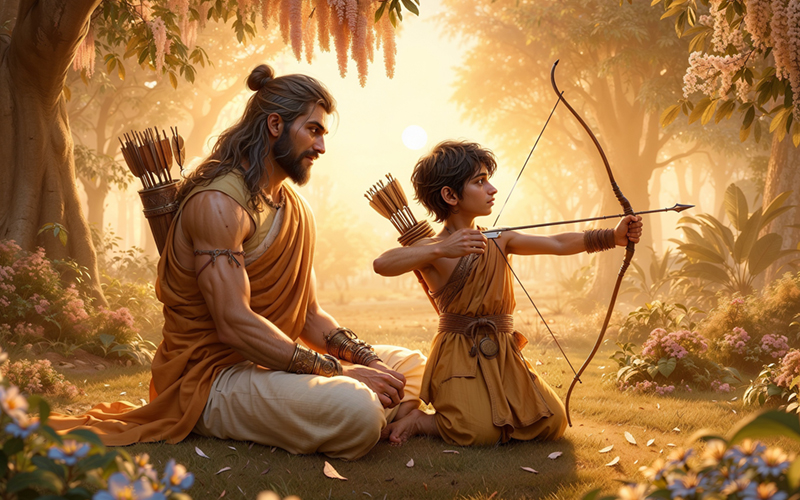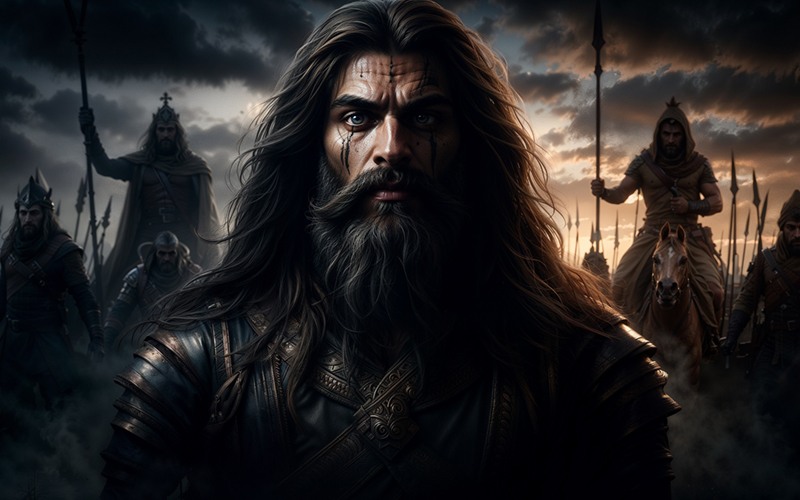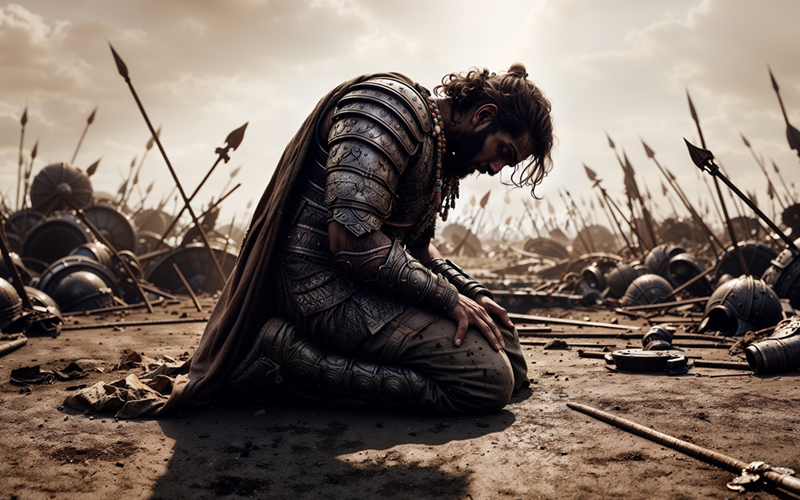Physical Address
Empirical System, 105 First Floor Pitru Krupa, Opp. R.K. Desai College, Koparli Road, Vapi (Gujarat) 396 191
Physical Address
Empirical System, 105 First Floor Pitru Krupa, Opp. R.K. Desai College, Koparli Road, Vapi (Gujarat) 396 191

In the vast spiritual landscape of the Mahabharata, some figures stand as towering symbols of knowledge and power. Dronacharya was one such pillar. Born with divine martial skills and destined for greatness, he was the revered guru who shaped the mightiest warriors of his age. But beneath the stoic exterior of the master archer lay the fragile heart of a man caught in an impossible emotional labyrinth.
His story is not one of glory, but of profound heartache—a timeless lesson on the conflict between duty, love, and the complex nature of Dharma.
When Dronacharya arrived at the court of Hastinapura, his purpose was clear: to train the Kuru princes in the art of war. He was the royal preceptor, and his students, both the Pandavas and the Kauravas, were his sacred responsibility.
He soon found a reflection of his own passion in the third Pandava, Arjuna. Their bond transcended the typical student-teacher relationship. In Arjuna’s discipline and divine talent, Drona saw the pinnacle of his teachings, a student who could one day surpass the master himself.
Yet, Drona’s heart was also bound by a fierce, paternal love for his own son, Ashwathama. All his actions, all his ambitions, were ultimately fueled by a simple desire: to give his son the status and security he himself had been denied. This dual devotion—to his star pupil and to his beloved son—set the stage for his life’s greatest conflict.
The drums of the Kurukshetra war shattered the peace, and Dronacharya was faced with an unimaginable choice. Bound by his oath and his salt, he accepted the role of Supreme Commander of the Kaurava army. This duty, however, placed him directly opposite the very students he had nurtured like his own children.
The battlefield became his personal hell. Across the field stood Arjuna—his pride, his prodigy—now his sworn enemy. How could he raise a weapon against the boy to whom he had taught every secret of archery?
Every arrow Arjuna fired was a testament to Drona’s mastery. But now, those same arrows, infused with his own knowledge, were aimed at his heart. This was the cruelest irony of his fate: to be confronted by the perfection of his own teachings.
Torn, he had to serve Duryodhana, whose cause he knew was unjust. His loyalty to the throne clashed violently with his love for his students and his own sense of Dharma. He was a general leading an army down a path of adharma, and every day on the battlefield eroded a piece of his soul.

The weight on Drona’s conscience grew unbearable on the thirteenth day of the war. As commander, he designed the deadly Chakravyuha formation—a strategic masterpiece that became the tomb for the brave, young Abhimanyu, Arjuna’s son.
In that moment, Drona the commander overruled Drona the guru. He had orchestrated the death of his beloved student’s child. As the Pandava camp echoed with cries of grief, Drona’s own heart shattered in silence. This act was more than a tactic of war; it was a profound betrayal of the sacred trust between a teacher and his disciples. The weight of Abhimanyu’s death would haunt him for the rest of his days.
Despite the inner turmoil, Drona fought on, driven by his duty and the lingering hope of securing a future for his son. But the Pandavas, guided by Krishna, knew his one vulnerability.
In the heat of battle, a cry went up, orchestrated to break his spirit: “Ashwathama is dead!” (It was an elephant of the same name, but the message was designed for his ears).
The news struck him like a celestial weapon. The warrior, the commander, the guru—all vanished in an instant. All that remained was a grieving father, his reason for fighting extinguished. The world lost its meaning. What was victory? What was a kingdom? What was duty without the love that fueled it?
Broken and utterly defeated from within, Drona laid down his arms. He sank to the floor of his chariot, not a warrior anymore, but a man consumed by grief, ready to release his soul.

Dronacharya’s journey is a poignant exploration of the human condition. His story teaches us that our greatest battles are often fought within. He was torn between:
In the end, he was not defeated by any warrior’s arrow. He was defeated by the weight of his own heart.
His tragedy reminds us that the path of Dharma is complex and often requires impossible choices. It is a testament to the fact that even the greatest of beings can be broken when their loyalties are divided and their love is used against them.
Have you ever felt caught between a sense of duty and the call of your heart? Share your reflections on Dronacharya’s impossible choice in the comments below.